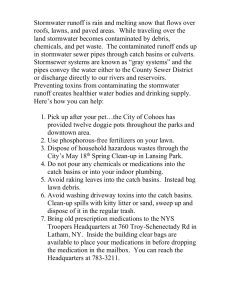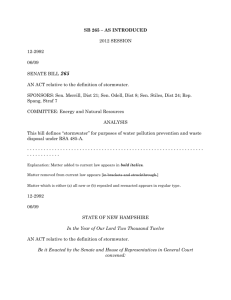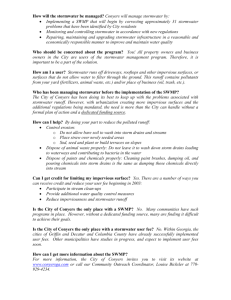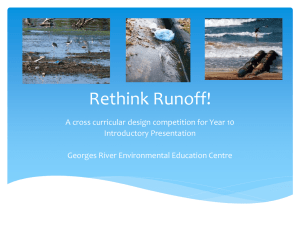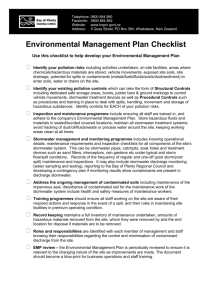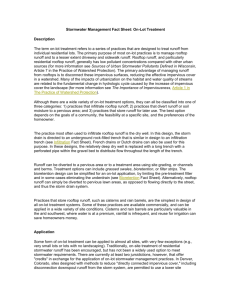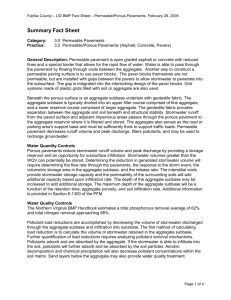Brochure on Stormwater Runoff
advertisement
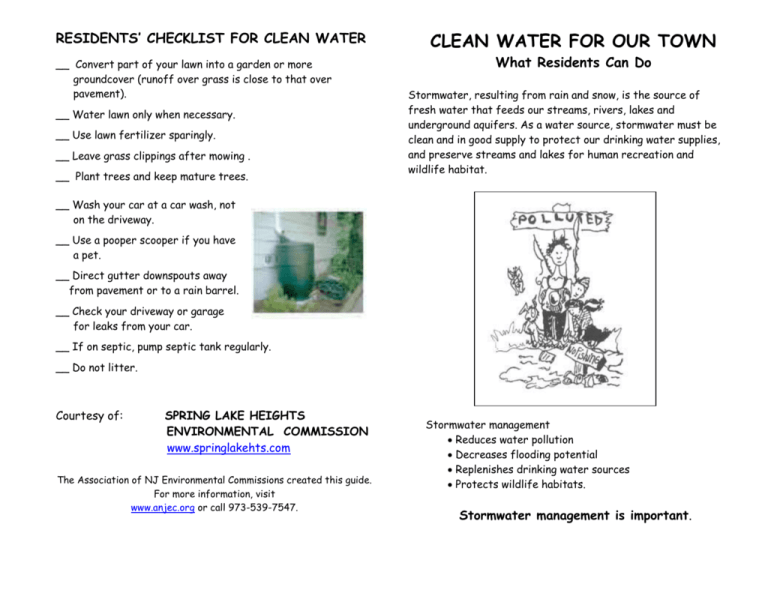
RESIDENTS’ CHECKLIST FOR CLEAN WATER __ Convert part of your lawn into a garden or more groundcover (runoff over grass is close to that over pavement). __ Water lawn only when necessary. __ Use lawn fertilizer sparingly. __ Leave grass clippings after mowing . __ Plant trees and keep mature trees. CLEAN WATER FOR OUR TOWN What Residents Can Do Stormwater, resulting from rain and snow, is the source of fresh water that feeds our streams, rivers, lakes and underground aquifers. As a water source, stormwater must be clean and in good supply to protect our drinking water supplies, and preserve streams and lakes for human recreation and wildlife habitat. __ Wash your car at a car wash, not on the driveway. __ Use a pooper scooper if you have a pet. __ Direct gutter downspouts away from pavement or to a rain barrel. __ Check your driveway or garage for leaks from your car. __ If on septic, pump septic tank regularly. __ Do not litter. Courtesy of: SPRING LAKE HEIGHTS ENVIRONMENTAL COMMISSION www.springlakehts.com The Association of NJ Environmental Commissions created this guide. For more information, visit www.anjec.org or call 973-539-7547. Stormwater management Reduces water pollution Decreases flooding potential Replenishes drinking water sources Protects wildlife habitats. Stormwater management is important. STORMWATER RUNOFF How we use land directly affects the way stormwater flows. Under undisturbed conditions, over half of precipitation infiltrates the soil and only about 10 percent runs off the surface. The natural vegetation acts like a sponge and a filter, slowing the flow and cleaning the stormwater. Roads, pavement and buildings (impervious surfaces) reduce the area where stormwater can soak into the soils to replenish water supplies. This means less water recharges underground aquifers, making them unable to keep up with the amount wells pump out. The impervious surfaces also cause problems with our lakes, rivers and oceans. Less water infiltration means more water flowing on the surface. Roadways and storm sewers act like superhighways for stormwater, speeding its flow. So much water flowing more quickly results in greater and more frequent flooding. It causes erosion, eating away the banks of rivers and streams. Stormwater also carries pollution. As water flows across land, it picks up all sorts of contaminants - litter, pesticides, fertilizer, pet wastes, petroleum products, and road salts. The increased volume and speed of stormwater runoff from paved surfaces wash more of these pollutants into water bodies. This can cause fish kills, force beach closings and degrade recreational areas. WHAT RESIDENTS CAN DO Reduce the Amount of Runoff Residents can reduce the amount of stormwater that runs off their properties by - Reducing the amount of lawn and pavement - Planting groundcover - Planting trees - Creating gardens, no mow areas, meadows - Separating pavement from other hard surfaces with a vegetated border. - Watering lawns only if necessary Keep Runoff Cleaner Residents can help reduce pollution in runoff by: - keeping a buffer along any stream on the property - avoiding use of pesticides - composting leaves and grass clippings - taking hazardous substances to a proper disposal repository -preventing objects or fluids from draining into stormwater grates or inlets.

